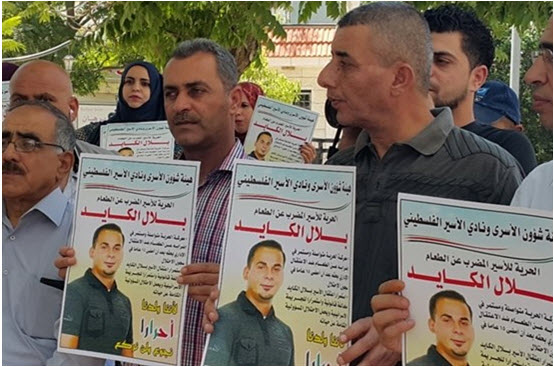The Palestinian Authority’s Health Ministry warned Tuesday, August 2, that Bilal Kayed, a hunger-striking prisoner held by Israel under administrative detention without charges, has suffered a massive deterioration in his condition which doctors say could bring about his sudden death. In response, a spokesperson for the Barzilai Medical Center in Ashkelon where Kayed is being treated insisted that his condition remains “satisfactory.”
Kayed, 35, has refused food for 50 days ever since he was immediately placed under administrative detention after completing a lengthy prison sentence. According to the Palestinian Health ministry, the prisoner, who is reportedly handcuffed to his hospital bed, is suffering from “severe weakness, vision problems, a lung infection, heart complications, and a rapid loss of weight.” According to the report, Kayed is being administered water, salt, and vitamins due to the possibility of his “sudden death,” warned about by doctors.
Kayed began his hunger strike in June in protest of his internment under Israel’s administrative detention law, which allows the state to hold prisoners without charges being filed and without trial for renewable six-month periods. He had just finished serving nearly 15years in prison for his membership in and alleged activities linked to the Popular Front for the Liberation of Palestine. On the day he was to have been released authorities placed him in administrative detention, prompting him to begin his hunger strike.
The Joint List Knesset faction said that Kayed might soon end his hunger strike after it was revealed that the detention order against him is months shorter than originally thought. A statement released by the Joint list said that Hadash MK Youssef Jabareen had submitted a query to Defense Minister Avigdor Liberman asking whether Kayed is to be released next week, as was apparently rumored. Deputy Defense Minister Eli Ben-Dahan responded for Liberman, saying that he was informed on Tuesday night that the Kayed’s administrative detention order is to expire on August 12. “If the matter regarding the end of the detention order turns out to be true, the prisoner is expected to end his hunger strike, since up until now it was assumed to be an administrative detention order for six months, until December 12,” the Joint List said.
According to reports in Palestinian media, last week some 100 Palestinian security prisoners initiated a mass hunger strike in Israeli jails. The inmates launched the fast in solidarity with three hunger strikers protesting their detention without trial – Bilal Kayed, Muhammad al-Balboul and Mahmud al-Balboul, the Palestinian Ma’an News Agency reported at the time.
According to Ma’an, the prominent Palestinian journalist Omar Nazzal, currently imprisoned by Israel, announced that he would begin a hunger strike on Thursday, August 4, joining scores of other prisoners currently refusing food to denounce Israel’s policy of administrative detention. Nazzal, a member of the Palestinian Journalists’ Syndicate, was detained by Israeli occupation forces in April and put in administrative detention. In a statement released on Wednesday, the Palestinian Journalists’ Syndicate called upon all international institutions to pressure the Israeli government to release Nazzal.
The Israel Prisons Service (IPS) at the Ofer prison, where Nazzal is being detained, has threatened to place Nazzal in solitary confinement if he starts a hunger strike. The large-scale solidarity movement among prisoners has resulted in an equally massive crackdown on mostly PFLP prisoners by the IPS, which has conducted multiple raids, cell block closures, confiscations of personal property, and transfers of detainees in attempts to quell the strikes. Israel has stepped up a crackdown on Palestinian journalists and media organizations since a wave of unrest increased last October. While the Israeli authorities have said those targeted were responsible for incitement against Israel, rights groups argue the crackdown is a blatant violation of media freedoms.
In addition, hundreds of Palestinians took part in a sit-in the city of Ramallah on Wednesday in solidarity with hunger-striking Palestinian prisoners in Israeli prisons. Ramallah and al-Bireh district Governor Laila Ghannam said that Palestinian leadership completely supports the prisoners, especially those hunger striking, and that their cause was one of the top priorities of Palestinian President Mahmoud Abbas. Ghannam stressed the importance of “popular activities supporting prisoners continuing, as prisoners deserve support from our people.” The head of Palestinian Committee of Prisoners’ Affairs, Issa Qaraqe called upon prisoners to stay united against Israeli violations against them, pointing out that solidarity was not only for a specific individual or party, but for the freedom of all prisoners. Qaraqe called upon the International Committee of the Red Cross, the United Nations, and all human rights institutions to support Palestinian prisoners and to actively fulfill all their responsibilities towards them.
Related:



